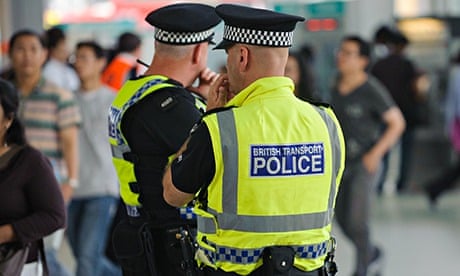Today the British transport police announced a 21% increase in reported sex offences on railways, rising to 1,117 in 2013-14 from 925 the previous year. The news comes in the same week that police released an image of a man they want to question over the prolonged sexual assault of a woman on a London train.
As I recall my own experience in a packed tube carriage three years ago, which I wrote about for the Guardian, I can still feel my body clench.
It took a long time for me to come to terms with what happened, to process it, to understand it, to stop questioning and blaming myself – and finally, to get angry. A year and a half after the incident I returned to the spot where I had previously been paralysed and I began to move – I decided to dance in protest. I danced for myself, but I also danced to raise the voices of all women who had been assaulted on their daily commutes. I needed to finally stand up and say what had happened, that it’s unacceptable and that it’s time to make a change.
Within 24 hours I’d been contacted by countless women who’d had similar experiences. Some had never told anyone about what had happened to them. “The exact same thing happened to me in Paris!!!” said one of the first comments on my blog. A flood of responses followed:
“Same happened to me in New York, only it was two men, one in front of me, the other behind.”
“I had a similar experience too, twice in two weeks with the same man.”
“Very similar story here – London underground, a guy deliberately pressing his erection into my buttocks. I was frozen with shock and I so wish I had moved or confronted him.”
Other responses I received were less positive, leading me to reflect on possible reasons as to why victims of sexual assault on public transport might be loth to report their experiences. After going public, I was sent personal messages detailing precisely how my experience couldn’t possibly be true; how I was an “attention-seeking whore”; how they, too, would like to sexually assault me.
My freeze response was also scrutinised. “Personally I think an elbow to the bastard’s throat or a scream of ‘fucking pervert’ at the time would have done better than dancing weeks later,” said one commenter. Many people, instead of focusing on my attacker, chose to detail at length how I should have behaved during my attack, and how, if I hadn’t been quite so weak, I could have stopped him. The message was that it was my fault, that I deserved it, and that there were plenty more people out there who wanted to make me feel unsafe and reinforce their power over me.
I still get messages from people about their experiences: women wrapped up in shame and guilt about how they’d responded to their assaults; women who had felt silenced, disempowered and furious all in the same moment; women looking for understanding and companionship.
I firmly believe that by talking openly about our experiences we can not only begin understand them, but also start to reveal the scale and pervasiveness of the problem.
I am pleased to see an increase in the levels of reporting. It demonstrates a changing tide, and shows that women finally feel able to report incidents in the knowledge that the police will take them seriously and investigate incidents sensitively. This progress has been accelerated in part by Project Guardian, an initiative by the British transport police to reduce sexual offences on public transport and to increase reporting rates. Advised by the Everyday Sexism Project, the End Violence Against Women Coalition and Hollaback! London, the project has involved training about 2,000 patrolling police officers how to manage this type of incident. It has “weeks of action” to raise the profile of the project and a dedicated freephone and text number where victims can easily report crimes in confidence.
But Project Guardian is part of a wider movement of feminist activism that is challenging accepted norms and empowering women to take a stand.
This problem is so much wider and deeper than a one-off grope on the tube. The sexism that sees women assaulted on public transport is the same sexism that permits street and workplace harassment; that keeps women out of boardrooms; that tells girls what careers are and are not acceptable for them and what toys they should play with; that sees women’s bodies objectified throughout the media.
We can’t tackle these issues in isolation. If we want a world where women have genuine parity then we all – male and female – need to start speaking up wherever and whenever we see these issues.
